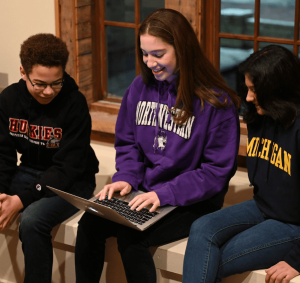Between spending hours on homework after school, balancing sports and other extracurriculars, and sometimes even working a part-time job, the demands of high school can be exhausting—leading to a condition called academic burnout.
Academic burnout occurs when students are unable to maintain a healthy balance between their home life and school responsibilities, and the effort to keep up with schoolwork becomes overwhelming. Burnout was originally used to describe workplace exhaustion, but it also applies to students’ struggles. Left unchecked, academic burnout can lead to poor quality of life, anxiety, and depression, risky behaviors such as gambling and drug use, and underachievement or even drop-outs (Farina et al., 2020). Read on to learn about academic burnout and what you can do to avoid it.
Academic burnout has three components:
- Overwhelming emotional exhaustion,
- Feelings of cynicism about and detachment from school, and
- A sense of ineffectiveness and lack of accomplishment
Academic burnout is a serious condition, but it can be successfully treated. However, it’s best to catch it early, before things become unmanageable. Watch for the following signs of academic burnout:

Your College Admissions Journey, Mapped Out!
Introducing our college planning timeline with a handy checklist of essential tasks, a step-by-step guide for every grade level, from freshman to senior year, AND financial aid, college applications, extracurricular activities, and more.
- Chronic and persistent physical and mental exhaustion, regardless sleep levels
- Fatigue and insomnia
- Low motivation
- Irritability or lashing out
- Lack of confidence in abilities
- Failure to meet important deadlines
- Decreasing effort in school
- Increasing absences
- More frequent physical illness
- Poor self-care habits such as substance abuse, overeating, poor hygiene, and staying up too late
- Inability to concentrate during class or on homework
- Lack of interest in school subjects that used to be interesting
- Disinterest in the future
- Overwhelming anxiety or depression
10 tips for handling academic burnout
If you recognize any of the above symptoms in yourself or your child, it’s time to address the burnout and prevent it from worsening.
Recognize the symptoms of burnout.
Before coping with academic burnout, you must first learn to recognize it. Journaling can be an excellent self-reflective tool to help you become aware of your thoughts, emotions, and behaviors, which can help you determine whether you’re experiencing burnout. f you are the parent of a student, be sure to familiarize yourself with the symptoms of burnout mentioned above and watch for them in your child.
Set reasonable goals.
Before academic burnout gets the best of you, learn to set reasonable goals for yourself. If you are already overly busy balancing a job, schoolwork, and other after-school activities, limit the goals you aim to accomplish each day. When school work starts to feel overwhelming, try breaking down larger, more complex assignments into smaller chunks. This will buoy your confidence and give you the confidence to move forward.
Take time for yourself.
An essential part of managing academic burnout is taking time for yourself outside of school-related and academic activities. For example, you might engage in a hobby that interests you, go for a walk in nature, enjoy a little quality time with a good friend, or practice meditation before going to sleep at night.
Stick to a routine.
Sticking to a regular daily routine can help you manage stress and feel more in control of your life. Research has consistently shown benefits to keeping a daily schedule that contains a balance of school and therapeutic activities. A daily routine can lower stress, improve your health, and help you be more productive in school.
Take study breaks.
It’s essential to take breaks from studying. Regular breaks help students retain more information and feel less overwhelmed. In addition, having some downtime actually encourages productivity by enhancing attention and motivation.
Seek professional help.
Often depression and academic burnout go hand in hand, so if you’re struggling, it’s important to seek out help from a mental health professional. Working with a therapist can help you problem-solve and determine the causes of your academic burnout. Therapy can also provide a venue in which you can express your frustrations. Often just telling someone what’s bothering you can provide much-needed relief.
Sleep 8-10 hours every night.
According to the Centers of Disease Control and Prevention, adolescents aged 13-18 require 8-10 hours of sleep. By getting enough sleep, you will feel better rested and more able to take on life’s challenges, both academically and emotionally. Getting proper sleep is crucial for concentration and mental health, besides being essential for your physical well-being.
Exercise.
Exercise is good for both mind and body and can lead to improved mental health. During exercise, you release feel-good chemicals called endorphins, which boost mood and help reduce anxiety and cope with burnout. In addition, exercise sharpens focus and improves mental and physical stamina, which may help you get through long school days.
Avoid procrastination.
Procrastinating on assignments can lead you to feel very overwhelmed and stressed out. Procrastinating can increase feelings of stress, anxiety, and ultimately disappointment if things don’t go as planned. Maintaining a planner can help you keep track of upcoming assignments and exams, which may aid you in avoiding procrastination.
Seek out support.
If you’re experiencing signs of academic burnout, seek out support from parents, teachers, guidance counselors, social workers, and friends. Suffering in silence will only make things worse. Even if you’re only noticing one or two symptoms of burnout, it’s best to seek out support from others before it gets worse.
The bottom line:
Academic burnout can be debilitating, leading to feelings of cynicism, reduced productivity, and emotional exhaustion. However, with better awareness and the right approach, you can tackle academic burnout and improve your mental health. Parents and teachers also need to be aware of the signs and symptoms of academic burnout in order to support struggling students. Academic burnout is a dire problem, but together we can nip it in the bud!
If you are interested in learning more about the college admissions process, or about college life in general, check out more of our blogs and resources here at HelloCollege. We believe that preparing for university shouldn’t be scary, and we are here to help guide you or your student through the process every step of the way.
Sources:
- Dupéré V., Leventhal T., Dion E., Crosnoe R., Archambault I., Janosz M. (2015). Stressors and turning points in high school and dropout: a stress process, life course framework. Rev. Educ. Res. 85 591–629. 10.3102/0034654314559845
- Farina, E., Ornaghi, V., Pepe, A., Fiorilli, C., & Grazzani, I. (2020). High school student burnout: Is empathy a protective or risk factor?. Frontiers in Psychology, 11, 897. https://doi.org/10.3389/fpsyg.2020.00897
- Fiorilli C., De Stasio S., Di Chiacchio C., Pepe A., Salmela-Aro K. (2017). School burnout, depressive symptoms and engagement: their combined effect on student achievement. Int. J. Educ. Res. 84, 1–12. 10.1016/j.ijer.2017.04.001
- Prabu, P. S. (2015). A study on academic stress among higher secondary students. International Journal of Humanities and Social Science Invention, 4(10), 63-68.
- Usán Supervía, P., & Salavera Bordás, C. (2020). Burnout, Goal Orientation and Academic Performance in Adolescent Students. International journal of environmental research and public health, 17(18), 6507. https://doi.org/10.3390/ijerph17186507



